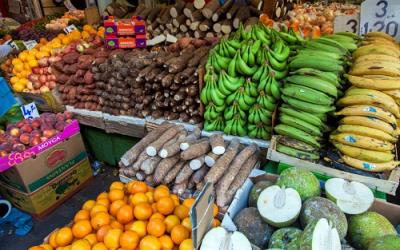As the coronavirus tears the global economy into a recession, one grave concern for millions of households has been the impact this will have on food prices security especially in Ghana and across Africa.
FAO Assistant Director-General and Regional Representative for Africa Abebe Haile-Gabriel in an online interview with JoyBusiness explained that building resilience is the solution to increased vulnerability in food supply chains due to coronavirus.
“Covid-19 strikes at the centre of Africa's unique vulnerability. There are mechanisms to mitigate the pandemic’s impacts on Africa's most vulnerable people. Building the resilience of vulnerable communities and agricultural systems is the sustainable solution,” he stated.
Already, there has been a national debate over the cost of foodstuff at various market centres amid the Coronavirus pandemic with the Agric Minister, Owusu Afriyie Akoto insisting “cost of food is so far the lowest even in cities like Accra”.
Meanwhile, some Ghanaians, speaking to JoyBusiness say the cost of foodstuff is worryingly high across some markets.
Of the 135 million people globally who are estimated to be experiencing crisis levels of acute food insecurity, more than half live in Africa.
According to recent FAO analysis, in the absence of timely and effective policies, millions of more people around the world are likely to join the ranks of the hungry as a result of the Covid-19-triggered recession.
Overlapping crises testing communities
Haile-Gabriel set out the main challenges facing governments and humanitarian and development partners in supporting vulnerable communities to weather this latest crisis.
The region’s agriculture sector has been hit by three shocks in three years: Fall Armyworm beginning in 2018, Desert Locust swarms that began in 2019, and now Covid-19. At the same time, already-fragile communities are grappling with conflict, drought and floods.
Nationwide lockdowns and movement restrictions are impeding trade and livelihoods. The fisheries sector, for example, is one of the hardest hit due to Covid-19.
Food preservation capacities in Africa are low, including for fresh fish, and therefore losses have been significant, he said. The lockdown in urban areas meant fish markets closed, so fish value chain actors were negatively affected, and restaurant closures reduced demand.
The self-employed and wage workers in the informal economy are particularly vulnerable to the pandemic’s effects.
They include women, youth and migrant workers and, without effective social protection measures, they disproportionately bear the brunt of the pandemic’s resulting underemployment, unemployment and loss of livelihoods.
Africa also has a heavy reliance on food imports, and border closures and other restrictions have meant people’s access to healthy diets has been reduced, especially in countries already affected by high levels of food insecurity.
Overcoming Covid-19 challenges
Turning to solutions, the Assistant Director-General said FAO’s enhanced advocacy at all levels helped to reopen or keep food and agriculture supply chains alive.
“The concerted actions of FAO, together with other like-minded partners, have contributed towards exempting food supply chains from the lockdowns through defining them as essential services,” he said.
He also said FAO’s advocacy helped keep supply chains open so that measures to control the Desert Locust outbreak in East Africa - “a crisis within a crisis” - could continue.
FAO Africa is focusing not only on short-term measures but medium- and long-term responses as well. Technical assistance for socio-economic assessments, and data and knowledge sharing are supporting evidence-based policy formulation and implementation.
Countries and partners must plan now for a better recovery, to steer Africa towards a more resilient and sustainable path. Otherwise, hard-won gains to reduce hunger and poverty are at risk.
Latest Stories
-
Police arrest school proprietor for preventing BECE candidates from writing exam
6 minutes -
Deepen fight against galamsey to restore public trust – Dr Ken Ashigbey urges gov’t
8 minutes -
Ken Ashigbey criticises government over failure to revoke LI 2462
27 minutes -
Galamsey crisis: GCAG demands urgent government action amid broken promises
35 minutes -
Over 60 MPs storm Bawumia’s office to support his bid for 2028 election
60 minutes -
We met $200m and GH₵300m of debts when we assumed control of DVLA – CEO reveals
1 hour -
Dafeamekpor denies restrictions on Minority’s role in Parliament’s Appointment Committee
1 hour -
Galamsey fight a mirage, cosmetic under Mahama’s NDC – GAP-F declares
2 hours -
DVLA to begin excavator enforcement operation from 1st July – Acting CEO
2 hours -
Alarming study finds greater suicide risk among screen-addicted teens
2 hours -
Center for International Mediators and Arbitrators holds Investiture in Ghana
2 hours -
Energy Commission denies issuing charcoal licenses for export amid booming trade in Northern Ghana
2 hours -
DVLA to introduce chip-embedded number plates
2 hours -
2025 BECE: Kintampo court sentences 4 for malpractices, others remanded
2 hours -
Thai PM faces calls to quit after leaked phone call
2 hours

